高中英语选修八Unit3Inventors and inventions Period4Grammar课件(27张PPT)
文档属性
| 名称 | 高中英语选修八Unit3Inventors and inventions Period4Grammar课件(27张PPT) |  | |
| 格式 | zip | ||
| 文件大小 | 1.2MB | ||
| 资源类型 | 教案 | ||
| 版本资源 | 人教版(新课程标准) | ||
| 科目 | 英语 | ||
| 更新时间 | 2020-04-27 21:56:26 | ||
图片预览

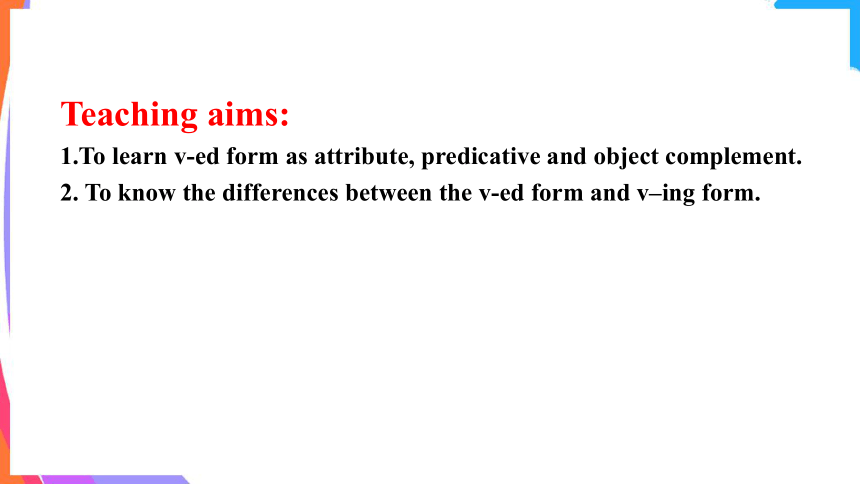
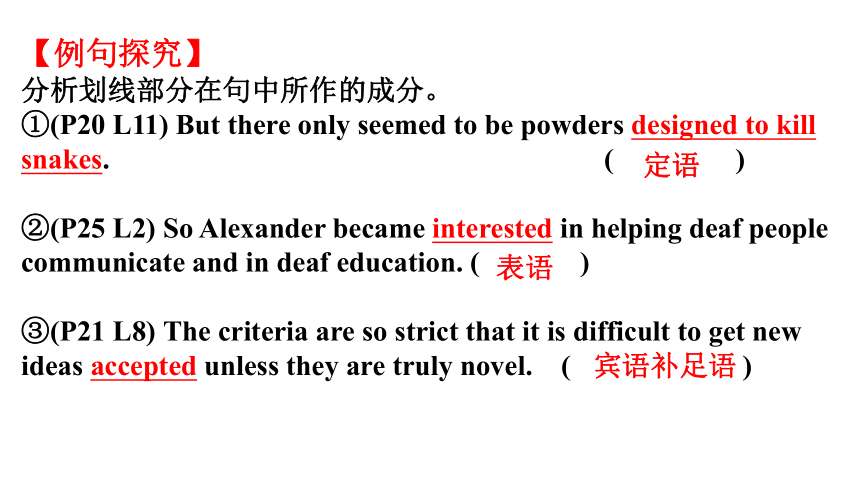

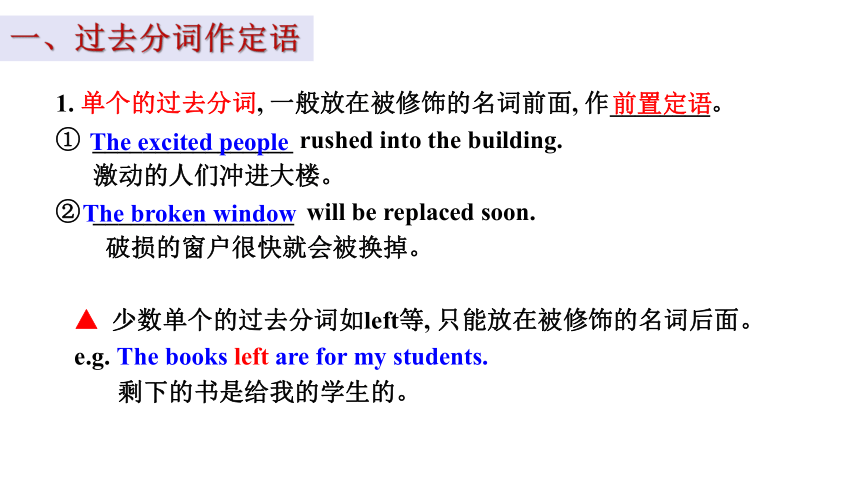
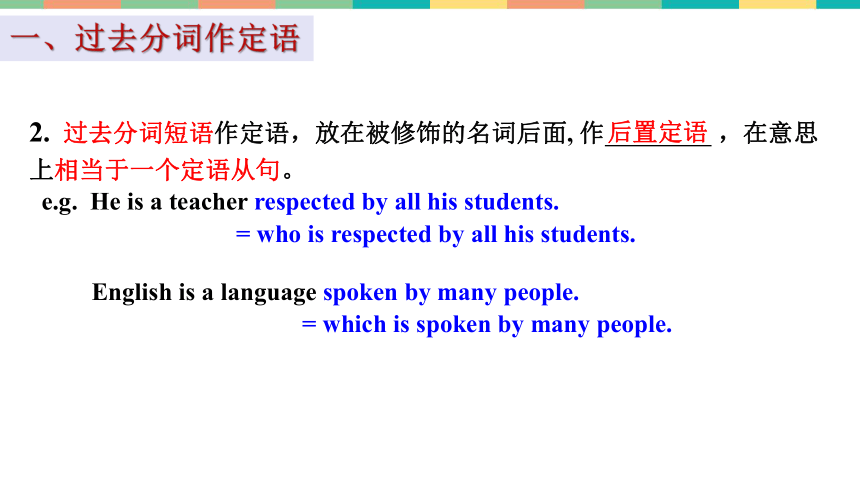
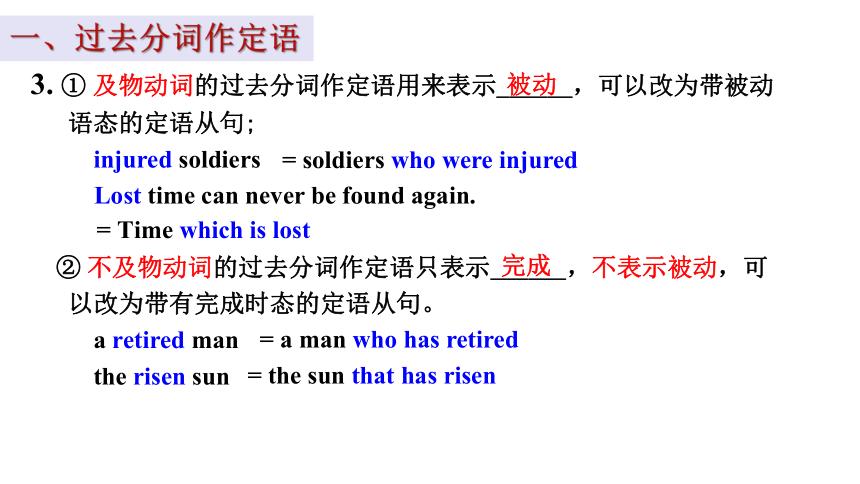
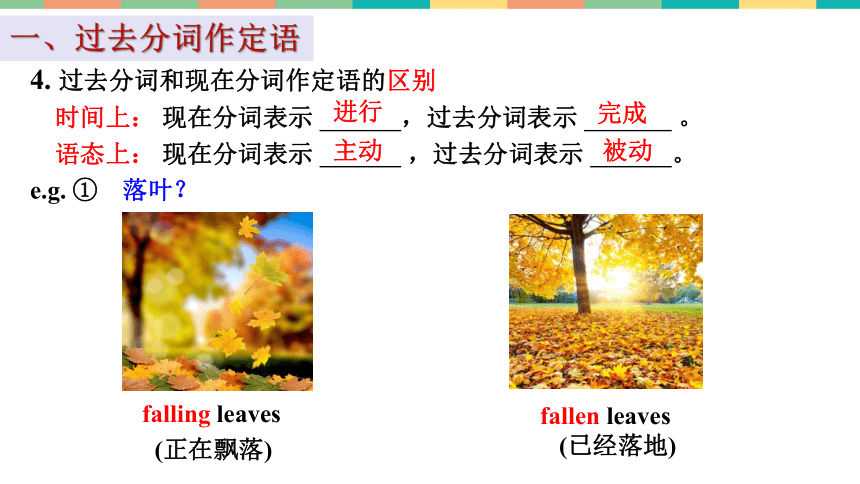
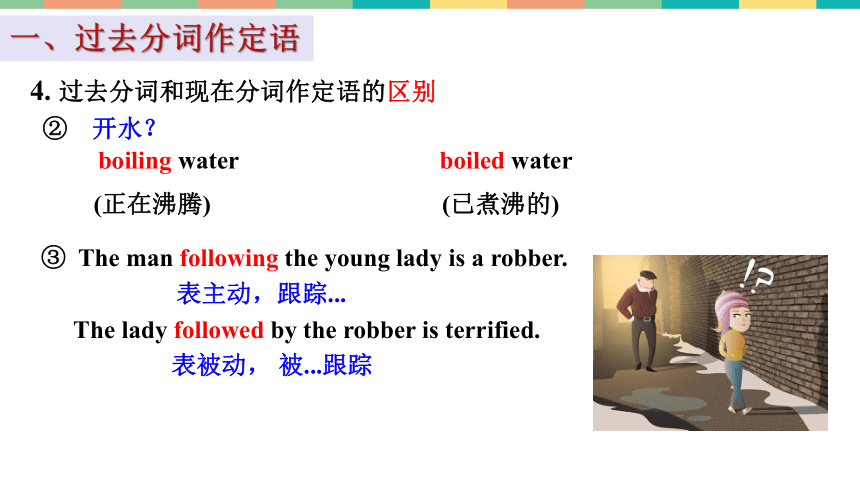
文档简介
(共27张PPT)
高中英语(人教版) 选修八
B8U3 Inventors and inventions
Period 4 Grammar
Teaching aims:
1.To learn v-ed form as attribute, predicative and object complement.
2. To know the differences between the v-ed form and v–ing form.
【例句探究】
分析划线部分在句中所作的成分。
①(P20 L11) But there only seemed to be powders designed to kill snakes. ( )
②(P25 L2) So Alexander became interested in helping deaf people communicate and in deaf education. ( )
③(P21 L8) The criteria are so strict that it is difficult to get new ideas accepted unless they are truly novel. ( )
宾语补足语
表语
定语
一、过去分词作定语
injured fingers 受伤的手指
a finger injured in the accident
spoken English 英语口语
a language spoken by many people
written exercises 书面练习
a book written by Lu Xun
定语分为前置定语和后置定语
1. 单个的过去分词, 一般放在被修饰的名词前面, 作________。
① ________________ rushed into the building.
激动的人们冲进大楼。
② ________________ will be replaced soon.
破损的窗户很快就会被换掉。
▲ 少数单个的过去分词如left等, 只能放在被修饰的名词后面。
e.g. The books left are for my students.
剩下的书是给我的学生的。
前置定语
The excited people
The broken window
一、过去分词作定语
2. 过去分词短语作定语,放在被修饰的名词后面, 作 ,在意思上相当于一个定语从句。
e.g. He is a teacher respected by all his students.
English is a language spoken by many people.
后置定语
一、过去分词作定语
= who is respected by all his students.
= which is spoken by many people.
3. ① 及物动词的过去分词作定语用来表示______,可以改为带被动语态的定语从句;
injured soldiers
Lost time can never be found again.
② 不及物动词的过去分词作定语只表示______,不表示被动,可以改为带有完成时态的定语从句。
a retired man
the risen sun
被动
完成
一、过去分词作定语
= soldiers who were injured
= Time which is lost
= a man who has retired
= the sun that has risen
4. 过去分词和现在分词作定语的区别
时间上: 现在分词表示 ,过去分词表示 。
语态上: 现在分词表示 ,过去分词表示 。
e.g. ① 落叶?
一、过去分词作定语
主动
完成
进行
被动
falling leaves
(正在飘落)
fallen leaves
(已经落地)
4. 过去分词和现在分词作定语的区别
② 开水?
③ The man following the young lady is a robber.
The lady followed by the robber is terrified.
一、过去分词作定语
boiling water boiled water
(正在沸腾)
(已煮沸的)
表主动,跟踪...
表被动, 被...跟踪
4. 过去分词和现在分词作定语的区别
▲ 特别注意:
过去分词(done)作定语表示被动和已完成
现在分词的被动式(being done)表示被动和正在进行
动词不定式的被动式 ( to be done ) 表示被动和将来
e.g. The house (build) last year was pulled down last week.
The house (build) now will be completed next month.
The house (build) next month is designed by his father.
一、过去分词作定语
being built
to be built
built
1. To return to the problem of water pollution, I’d like you to look at a study _____ in Australia in 2012.
A. having conducted B. to be conducted C. conducting D. conducted
2. For breakfast he only drinks juice from fresh fruit _____ on his own farm.
A. grown B. being grown C. to be grown D. to grow
3. The manager walked into the room to attend the meeting _____ then.
A. held B. holding C. being held D. to be held
held 表被动和完成 holding表主动和进行 being held表被动和进行
to be held表被动和将来
D
practice
A
C
a study 与 conduct 之间是动宾关系,故用过去分词短语作后置定语。
fresh fruit 与 grow 之间是动宾关系
4. Don't use words or expressions (know) only to people with specific knowledge.
5. You are to join a team (consist) of 20 people.
6. The club, (found) 25 years ago, is holding a party for past and present members.
7. The meeting (hold) tomorrow is of great importance.
practice
to be held
consisting
known
founded
The team consists of 20 people. consist 是不及物动词
既要表被动,又要表将来(tomorrow),用 to be done
words or expressions 和 know之间是动宾关系
club 和 found之间是动宾关系
1. 过去分词作表语时,放在系动词(be/ look / seem / appear / feel / remain / become / get 等)之后,表示主语的感受或所处的状态。
e.g. All the doors are locked.
所有的门都是锁着的。
The children looked puzzled.
孩子们看起来迷惑不解。
Our coach seemed pleased at the result of the game.
教练似乎对比赛结果感到满意。
二、过去分词作表语
2. 过去分词作表语与被动语态的区别
作表语的过去分词表示主语的状态,相当于一个形容词;
被动语态中的过去分词表示动作,句子的主语是动作的承受者,后面常跟by短语。
e.g. The window is broken.
窗户破了。
The window was broken by Tom.
窗户被汤姆打破了。
二、过去分词作表语
3. 过去分词作表语与现在分词作表语的区别
现在分词(v-ing形容词),意为“令人…...的”,含有主动意味。
过去分词(v-ed形容词),意为“感到…...的”,含有被动意味;
eg. What he said was disappointing.
We were disappointed at what he said.
此类词常见的有:
surprising, surprised; confusing, confused;
astonishing, astonished; satisfying, satisfied;
encouraging, encouraged; inspiring, inspired等
二、过去分词作表语
1.The pilot asked all the passengers on board to remain ________ as the plane was making a landing.
A. seat B. seating C. seated D. to be seating
2. What seemed most ________ to me was that no one thought his safety.
A. surprised B. surprise C. surprising D. to surprise
3. He said he was (please) with the progress of economy, but I found some of what he said was (worry).
practice
C
C
pleased
worrying
remain seated 为系表结构,表示状态。
1. 用作宾语补足语的过去分词一般都是及物动词, 表示被动意义或完成意义, 有时候两者兼而有之。作宾语补足语的过去分词与宾语有逻辑上的动宾(被动)关系, 即宾语是过去分词动作的对象。
e.g. He is trying to make himself understood.
他正努力使别人听懂自己(的话)。
▲少数不及物动词的过去分词用作宾补时, 强调动作完成后的状态。
e.g. They found all the guests gone when they woke up.
当他们醒来时, 发现所有的客人都走了。
三、过去分词作宾语补足语
2. 基本用法
①用作表示感觉和心理状态的动词的宾语补足语, 概括为“五视两听一感觉”(see, watch, notice, observe, look at; hear, listen to; feel)和 think, suppose, consider, find等。
e.g. I heard the song sung in English.
我听到有人用英文唱这首歌。
They consider the matter _______ ( settle) .
他们认为这问题解决了。
We thought the game _______ ( lose).
我们以为比赛输了。
settled
三、过去分词作宾语补足语
lost
②作使役动词的宾语补足语, 这类动词包括make, let, have,以及表示“致使”意义的动词如keep, leave, get等。
e.g. I _______________ once a month.
我每个月理一次发。
He raised his voice to make himself ___________.
他提高声音,让别人能听见他说话。
三、过去分词作宾语补足语
have my hair cut
heard
① (请别人)把某事做完。
e.g. She had her house repaired.
她请人把屋子修好了。
② 遭遇某种意外情况。
e.g. She had her wallet stolen yesterday.
昨天她的钱包被偷了。
③ 完成某事 (自己也可能参与)。
e.g. I have had all my spelling mistakes corrected.
我把所有的拼写错误都改正了。
▲ “have + 宾语 + done”结构有三个含义:
三、过去分词作宾语补足语
③作表示希望、要求、命令等动词的宾语补足语,这类动词包括like, want, wish, expect, order等”这一类动词的后面作宾语补足语。
e.g. He won’t like such questions discussed at the meeting.
他不喜欢在会议上讨论这样的问题。
They wish the TV serial plays continued.
他们希望电视连续剧继续播下去。
三、过去分词作宾语补足语
④用在“with + 宾语 + 宾补”结构中, 过去分词与宾语之间是动宾关系。
e.g. The students were sitting in the classroom with their eyes fixed on the teacher.
The thief was brought in, __________________ behind his back.
小偷被带进来了, 双手被绑在后面。
with his hands tied
三、过去分词作宾语补足语
3. 过去分词与现在分词作宾语补足语的区别
① 感官动词 + 宾语 + 宾补
e.g. I saw Tom blamed by his wife. 被动
I saw Tom blaming his wife . 主动(进行)
② 使役动词 + 宾语 + 宾补
e.g. I had my car repaired yesterday. 被动(完成)
The boss has his workers working day and night. 主动(持续)
③ with + 宾语 + 宾补
e.g. With everything done, she went home. 被动(完成)
We could finish the work on time with the machine helping us. 主动
三、过去分词作宾语补足语
1. Claire had her luggage (check)an hour before her plane left.
2. You'd better not have the light (burn) all day long.
3. I'll have someone (repair) the computer.
4. Michael put up a note beside the bed to keep himself (remind) of his own dreams.
5. With a lot of difficult poblems ( settle), the newly-elected president is having a hard time.
6. With all the problems ( settle), Tom left the company.
practice
checked
burning
repair
reminded
to settle
settled
have sb do sth , (省略to的)不定式做宾补表示主动和将来
to settle 表将来,主动形式表达被动含义
单句改错
1. The match between Class 4 and Class 5 is sure to be excited.
2. The villagers had many trees planting just then.
3. There were the brothers looked very much alike.
4. The old sick man lay on the bed with his eyes closing.
exciting
practice
planted
closed
looking
1. Review the usage of v-ed form.
2. Do some relevant exercises.
Homework
Thank you !
高中英语(人教版) 选修八
B8U3 Inventors and inventions
Period 4 Grammar
Teaching aims:
1.To learn v-ed form as attribute, predicative and object complement.
2. To know the differences between the v-ed form and v–ing form.
【例句探究】
分析划线部分在句中所作的成分。
①(P20 L11) But there only seemed to be powders designed to kill snakes. ( )
②(P25 L2) So Alexander became interested in helping deaf people communicate and in deaf education. ( )
③(P21 L8) The criteria are so strict that it is difficult to get new ideas accepted unless they are truly novel. ( )
宾语补足语
表语
定语
一、过去分词作定语
injured fingers 受伤的手指
a finger injured in the accident
spoken English 英语口语
a language spoken by many people
written exercises 书面练习
a book written by Lu Xun
定语分为前置定语和后置定语
1. 单个的过去分词, 一般放在被修饰的名词前面, 作________。
① ________________ rushed into the building.
激动的人们冲进大楼。
② ________________ will be replaced soon.
破损的窗户很快就会被换掉。
▲ 少数单个的过去分词如left等, 只能放在被修饰的名词后面。
e.g. The books left are for my students.
剩下的书是给我的学生的。
前置定语
The excited people
The broken window
一、过去分词作定语
2. 过去分词短语作定语,放在被修饰的名词后面, 作 ,在意思上相当于一个定语从句。
e.g. He is a teacher respected by all his students.
English is a language spoken by many people.
后置定语
一、过去分词作定语
= who is respected by all his students.
= which is spoken by many people.
3. ① 及物动词的过去分词作定语用来表示______,可以改为带被动语态的定语从句;
injured soldiers
Lost time can never be found again.
② 不及物动词的过去分词作定语只表示______,不表示被动,可以改为带有完成时态的定语从句。
a retired man
the risen sun
被动
完成
一、过去分词作定语
= soldiers who were injured
= Time which is lost
= a man who has retired
= the sun that has risen
4. 过去分词和现在分词作定语的区别
时间上: 现在分词表示 ,过去分词表示 。
语态上: 现在分词表示 ,过去分词表示 。
e.g. ① 落叶?
一、过去分词作定语
主动
完成
进行
被动
falling leaves
(正在飘落)
fallen leaves
(已经落地)
4. 过去分词和现在分词作定语的区别
② 开水?
③ The man following the young lady is a robber.
The lady followed by the robber is terrified.
一、过去分词作定语
boiling water boiled water
(正在沸腾)
(已煮沸的)
表主动,跟踪...
表被动, 被...跟踪
4. 过去分词和现在分词作定语的区别
▲ 特别注意:
过去分词(done)作定语表示被动和已完成
现在分词的被动式(being done)表示被动和正在进行
动词不定式的被动式 ( to be done ) 表示被动和将来
e.g. The house (build) last year was pulled down last week.
The house (build) now will be completed next month.
The house (build) next month is designed by his father.
一、过去分词作定语
being built
to be built
built
1. To return to the problem of water pollution, I’d like you to look at a study _____ in Australia in 2012.
A. having conducted B. to be conducted C. conducting D. conducted
2. For breakfast he only drinks juice from fresh fruit _____ on his own farm.
A. grown B. being grown C. to be grown D. to grow
3. The manager walked into the room to attend the meeting _____ then.
A. held B. holding C. being held D. to be held
held 表被动和完成 holding表主动和进行 being held表被动和进行
to be held表被动和将来
D
practice
A
C
a study 与 conduct 之间是动宾关系,故用过去分词短语作后置定语。
fresh fruit 与 grow 之间是动宾关系
4. Don't use words or expressions (know) only to people with specific knowledge.
5. You are to join a team (consist) of 20 people.
6. The club, (found) 25 years ago, is holding a party for past and present members.
7. The meeting (hold) tomorrow is of great importance.
practice
to be held
consisting
known
founded
The team consists of 20 people. consist 是不及物动词
既要表被动,又要表将来(tomorrow),用 to be done
words or expressions 和 know之间是动宾关系
club 和 found之间是动宾关系
1. 过去分词作表语时,放在系动词(be/ look / seem / appear / feel / remain / become / get 等)之后,表示主语的感受或所处的状态。
e.g. All the doors are locked.
所有的门都是锁着的。
The children looked puzzled.
孩子们看起来迷惑不解。
Our coach seemed pleased at the result of the game.
教练似乎对比赛结果感到满意。
二、过去分词作表语
2. 过去分词作表语与被动语态的区别
作表语的过去分词表示主语的状态,相当于一个形容词;
被动语态中的过去分词表示动作,句子的主语是动作的承受者,后面常跟by短语。
e.g. The window is broken.
窗户破了。
The window was broken by Tom.
窗户被汤姆打破了。
二、过去分词作表语
3. 过去分词作表语与现在分词作表语的区别
现在分词(v-ing形容词),意为“令人…...的”,含有主动意味。
过去分词(v-ed形容词),意为“感到…...的”,含有被动意味;
eg. What he said was disappointing.
We were disappointed at what he said.
此类词常见的有:
surprising, surprised; confusing, confused;
astonishing, astonished; satisfying, satisfied;
encouraging, encouraged; inspiring, inspired等
二、过去分词作表语
1.The pilot asked all the passengers on board to remain ________ as the plane was making a landing.
A. seat B. seating C. seated D. to be seating
2. What seemed most ________ to me was that no one thought his safety.
A. surprised B. surprise C. surprising D. to surprise
3. He said he was (please) with the progress of economy, but I found some of what he said was (worry).
practice
C
C
pleased
worrying
remain seated 为系表结构,表示状态。
1. 用作宾语补足语的过去分词一般都是及物动词, 表示被动意义或完成意义, 有时候两者兼而有之。作宾语补足语的过去分词与宾语有逻辑上的动宾(被动)关系, 即宾语是过去分词动作的对象。
e.g. He is trying to make himself understood.
他正努力使别人听懂自己(的话)。
▲少数不及物动词的过去分词用作宾补时, 强调动作完成后的状态。
e.g. They found all the guests gone when they woke up.
当他们醒来时, 发现所有的客人都走了。
三、过去分词作宾语补足语
2. 基本用法
①用作表示感觉和心理状态的动词的宾语补足语, 概括为“五视两听一感觉”(see, watch, notice, observe, look at; hear, listen to; feel)和 think, suppose, consider, find等。
e.g. I heard the song sung in English.
我听到有人用英文唱这首歌。
They consider the matter _______ ( settle) .
他们认为这问题解决了。
We thought the game _______ ( lose).
我们以为比赛输了。
settled
三、过去分词作宾语补足语
lost
②作使役动词的宾语补足语, 这类动词包括make, let, have,以及表示“致使”意义的动词如keep, leave, get等。
e.g. I _______________ once a month.
我每个月理一次发。
He raised his voice to make himself ___________.
他提高声音,让别人能听见他说话。
三、过去分词作宾语补足语
have my hair cut
heard
① (请别人)把某事做完。
e.g. She had her house repaired.
她请人把屋子修好了。
② 遭遇某种意外情况。
e.g. She had her wallet stolen yesterday.
昨天她的钱包被偷了。
③ 完成某事 (自己也可能参与)。
e.g. I have had all my spelling mistakes corrected.
我把所有的拼写错误都改正了。
▲ “have + 宾语 + done”结构有三个含义:
三、过去分词作宾语补足语
③作表示希望、要求、命令等动词的宾语补足语,这类动词包括like, want, wish, expect, order等”这一类动词的后面作宾语补足语。
e.g. He won’t like such questions discussed at the meeting.
他不喜欢在会议上讨论这样的问题。
They wish the TV serial plays continued.
他们希望电视连续剧继续播下去。
三、过去分词作宾语补足语
④用在“with + 宾语 + 宾补”结构中, 过去分词与宾语之间是动宾关系。
e.g. The students were sitting in the classroom with their eyes fixed on the teacher.
The thief was brought in, __________________ behind his back.
小偷被带进来了, 双手被绑在后面。
with his hands tied
三、过去分词作宾语补足语
3. 过去分词与现在分词作宾语补足语的区别
① 感官动词 + 宾语 + 宾补
e.g. I saw Tom blamed by his wife. 被动
I saw Tom blaming his wife . 主动(进行)
② 使役动词 + 宾语 + 宾补
e.g. I had my car repaired yesterday. 被动(完成)
The boss has his workers working day and night. 主动(持续)
③ with + 宾语 + 宾补
e.g. With everything done, she went home. 被动(完成)
We could finish the work on time with the machine helping us. 主动
三、过去分词作宾语补足语
1. Claire had her luggage (check)an hour before her plane left.
2. You'd better not have the light (burn) all day long.
3. I'll have someone (repair) the computer.
4. Michael put up a note beside the bed to keep himself (remind) of his own dreams.
5. With a lot of difficult poblems ( settle), the newly-elected president is having a hard time.
6. With all the problems ( settle), Tom left the company.
practice
checked
burning
repair
reminded
to settle
settled
have sb do sth , (省略to的)不定式做宾补表示主动和将来
to settle 表将来,主动形式表达被动含义
单句改错
1. The match between Class 4 and Class 5 is sure to be excited.
2. The villagers had many trees planting just then.
3. There were the brothers looked very much alike.
4. The old sick man lay on the bed with his eyes closing.
exciting
practice
planted
closed
looking
1. Review the usage of v-ed form.
2. Do some relevant exercises.
Homework
Thank you !
